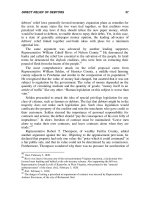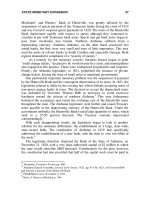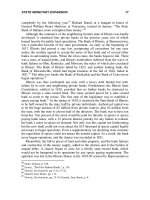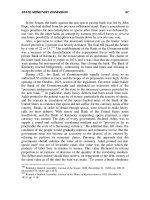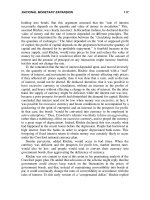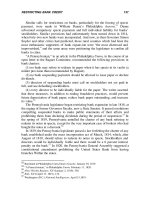GCSE 181
Bạn đang xem bản rút gọn của tài liệu. Xem và tải ngay bản đầy đủ của tài liệu tại đây (74.75 KB, 4 trang )
SƠ GD&ĐT VINH PHUC
TRƯƠNG THPT LIÊN SƠN
(Đề thi gồm: 04 trang)
ĐỀ KTCL ƠN THI THPT QUỐC GIA NĂM 20182019
Mơn: TIẾNG ANH – ĐỀ SỐ 181
Thời gian làm bài: 60 phút, không kể thời gian phát
đề
Ho va tên thi sinh:……………………………………………………………………. SBD:…………………………
Mark the letter A, B, C, or D on your answer sheet
part differs from the other three in pronunciation
Question 1. A. thanked
B. belonged
Question 2. A. chemical
B. approach
to indicate the word whose underlined
in each of the following questions.
C. cooked
D. laughed
C. achieve
D. challenge
Mark the letter A, B, C, or D on your answer sheet to indicate the word that differs from
the other three in the position of primary stress in each of the following questions.
Question 3. A. economics
B. conquerable
C. capability
D. optimistic
Question 4. A. enthusiastic
B. durability
C. civilization
D. humanitarian
Mark the letter A, B, C, or D on your answer sheet to indicate the word(s) CLOSEST in
meaning to the italicized word(s) in each off the following questions.
Question 5. The use of lasers in surgery has become relatively commonplace in recent years.
A. absolutely
B. relevantly
C. comparatively
D. almost
Question 6. From an airplane, the grasslands of the western prairie appear almost as uniform as a
placid sea. A. noisy
B. calm
C. seedy
D. fake
Mark the letter A, B, C, or D on your answer sheet to indicate the word(s) OPPOSITE in
meaning to the italicized word(s) in each off the following questions.
Question 7. The most important thing is to keep yourself occupied.
A. busy
B. comfortable
C. free
D. relaxed
Question 8. In most countries, compulsory military service does not apply to women.
A. optional
B. mandatory
C. beneficial
D. constructive
Mark the letter A, B, C, or D on your answer sheet to indicate the underlined part that needs
correction in each of the following questions.
Question 9. The wooden fence surrounded the factory is beginning to fall down because of the
rain. A. wooden
B. surrounded
C. to fall down
D. the
Question 10. A turtle differs from other reptiles in that its body is encased in a protective shell of
their own. A. from other B. in that
C. protective
D. their
Question 11. It is a good idea to be careful in buying or purchasing magazines from salespersons
who may come to your door.
A. It is
B. to be careful
C. buying or purchasing D. who
Mark the letter A, B, C, or D on your answer sheet to indicate the most suitable response to
complete each of the following exchanges.
Question 12. Mrs. Mai: “____________”
Mr. Brown: “Thank you. We are proud of him.”
A. Your kid is naughty.
B. Can we ask your child to take a photo?
C. Your child is just admirable.
D. I can give your kid a lift to school.
Question 13. Ken and Laura are saying goodbye to each other after going to LOTTE Center. And
they are going to have a date with each other later.
Laura: “Well, it’s getting late. May be we could get together sometime.” Ken: “__________”
A. Nice to see back you.
B. Take it easy.
C. Sounds good. I’ll give you a call.
D. Yes, I’ve enjoyed it.
Mark the letter A, B, C, or D on your answer sheet to indicate the correct answer to each of the
following questions
Question 14. Not only_________ the exam but she also got a scholarship.
A. dis she pass
B. she passed
C. she has passed
D. has she passed
Question 15. He was the first person_________ the room.
A. entering
B. to enter
C. to be enter
D. having entered
Question 16. Fortunately, the company closed down because it couldn’t keep_________ with rapidly
changing technology.
A. speed
B. time
C. fast
D. pace
Question 17. The climate of China is similar in many ways to_________.
A. that of the United States
B. which of the United States
C. the United States
D. this of the United States
Question 18. Western women are more_________ than Asian women.
A. depend
B. independent
C. independently
D. dependence
Question 19. The twins look so much alike that no one can_________ them_________
A. take/ apart
B. tell/ away
C. tell/ apart
D. take/ on
Question 20. Air pollution poses a_________ to both human health and our environment.
A. jeopardy
B. difficulty
C. problem
D. threat
Question 21. The teacher always_________ that the students make an outline before writing a
complete essay. A. reports B. recommends
C. tells
D. says
Question 22. I have no patience with gossips. What I told Bill was a secret. He_________ it to you.
A. mustn’t read
B. shouldn’t have repeated
C. mustn’t have repeated
D. shouldn’t read
Question 23. _________ he was kidnapped by the Iraqui guerrillas yesterday has been confirmed.
A. That
B. What
C. If
D. Unless
Question 24. The people who_________ the survey said that they had examined over 1,000
accidents.
A. gave
B. proceed
C. set
D. conducted
Question 25. The teacher had some exercise_________ at home yesterday so that he can correct
them today. A. be done
B. to be done
C. being done
D. done
Read the following passage and mark the letter A, B, C or D on your answer sheet to indicate
the correct answer to each of the questions.
The three phases of human memory are the sensory memory, the short-term memory, and
the long-term memory. This division of the memory into phases is based on the length of time of
the memory.
Sensory memory is instantaneous memory. It is an image or memory that enters your mind
only for a short period of time; it comes and goes in under a second. The memory will not last
longer than that unless the information enters the short-term memory.
Information can be held in the short-term memory for about twenty seconds or as long as you are
actively using it. If you repeat a fact to yourself, that fact will stay in your short-term memory as
long as you keep repeating it. Once you stop repeating it, either it is forgotten or it moves into long
term memory.
Long-term memory is the huge memory tank that can hold ideas and images for years and
years. Information can be added to your long-term memory when you actively try to put it there
through memorization or when an idea or image enters your mind on its own.
Question 26. The best title for this passage would be__________.
A. The difference between sensory and short-term memory.
B. How long it takes to memorize.
C. The stages of human memory.
D. Human phases.
Question 27. The three phases of memory discussed in the passage are differentiated according
to__________. A. The location in the brain
B. The period of time it takes to remember something
C. How the senses are involved in the memory.
D. How long the memory lasts.
Question 28. The expression “is based on” in the first paragraph could be best replaced by
__________. A. Is on the top of B. is at the foot of
C. depends on
D. is below
Question 29. According to the passage, which type of memory is the shortest?
A. Sensory memory
B. Active memory
C. Short-term memory
D. Long-term memory
Question 30. According to the passage, when will information stay in your short-term memory?
A. For as long as twenty minutes
B. As long as it is being used.
C. After you have repeated it many times. D. When it has moved into long-term memory.
Question 31. All of the following are TRUE about long – term memory EXCEPT that__________.
A. it has a very large capacity.
B. it can hold information.
C. it is possible to put information into it through memorization.
D. memorization is the only way that information can get there.
Question 32. The expression “on its own” in the last sentence can be best replaced by “_________”
A. by itself
B. in it own time
C. with its possessions
D. in only one way
Question 33. It can be inferred from the passage that if a person remembers a piece of
information for two days, this is probably__________.
A. three phases of memory
B. the sensory memory
C. the short-term memory
D. the long-term memory
Read the following passage and mark the letter A, B, C, or D on your answer sheet to indicate
the correct word or phrase that best fits each of the numbered blanks.
When you first apply for a job, you (34)_________ not succeed in getting it. It’s always a good
(35)_________ to ask them to explain to you what prevent you from beating the other
candidates. Don’t complain about the situation, but ask them to advise you (36)_________ what
you can do better next time. Perhaps the interviewer disapproved of or disagree with something
you said. Perhaps they just glanced at your application and saw something that made it easy to
choose between you and another candidate. Don’t regard it as a failure, but recognize it as a
chance to learn more. (37)_________ you don’t worry too much about it and continue to believe in
yourself, you’ll eventually find the chance you’ve been waiting for. Then, your family and friends
will be able to (38)_________ you on your success.
Question 34.
A. might
B. wouldn’t
C. won’t
D. must
Question 35.
Question 36.
Question 37.
Question 38.
A. means
A. about
A. As far as
A. encourage
B. opinion
B. of
B. By far
B. congratulate
C. idea
C. over
C. So far
C. promote
D. method
D. in
D. As long as
D. depend
Read the following passage and mark the letter A, B, C or D on your answer sheet to indicate
the correct answer to each of the questions.
Telecommuting is some form of computer communication between employees’ homes and
offices. For employees whose job involve sitting at a terminal or word processor entering data or
typing reports, the location of the computer is of no consequence. If the machine can
communicate over telephone lines, when the work is completed, employees can dial the office
computer and transmit the material to their employers. A recent survey in USA Today estimates
that there are approximately 8,7 million telecommuters. But although the numbers are rising
annually, the trend does not appear to be as significant as predicted when Business Week
published “The Portable Executive” as its cover story a few years ago. Why hasn’t telecommuting
become more popular?
Clearly, change simply takes time. But in addition, there has been active resistance on the
part of many managers. These executives claim that supervising the telecommuters in a large
work force scattered across the country would be too difficult, or, at least, systems for managing
them are not yet developed, thereby complicating the manager’s responsibilities.
It is also true that employees who are given the option of telecommuting are reluctant to
accept the opportunity. Most people feel that they need regular interaction with a group, and
many are concerned that they will not have the same consideration for advancement if they are
not more visible in the office setting. Some people feel that even when a space in their homes is
set aside as a work area, they never really get away from the office.
Question 39. With which of the following topics is the passage primarily concerned?
A. An overview of telecommuting.
B. The failure of telecommuting.
C. The advantages of telecommuting.
D. A definition of telecommuting.
Question 40. How many Americans are involved in telecommuting?
A. More than predicted in Business Week. B. More than 8 million.
C. Fewer than last year.
D. Fewer than estimated in USA Today.
Question 41. The phrase “of no consequence” means___________.
A. of no use
B. irrelevant
C. of no good
D. unimportant
Question 42. The author mentions all of the following as concerns of telecommuting, EXCEPT
___________. A. the opportunities for advancement. B. the different system of supervision.
C. the lack of interaction with a group.
D. The work place is in the home.
Question 43. The word “them” in the second paragraph refers to_________.
A. telecommuters
B. systems
C. executives
D. responsibilities
Question 44. The reason why telecommuting has not become popular is that the employees
A. need regular interaction with their families.
B. are worried about the promotion if they are not seen at the office.
C. feel that a work area in their home is away from the office.
D. are ignorant of telecommuting.
Question 45. The word “reluctant” in the third paragraph can best be replaced by_________.
A. opposite
B. willing
C. hesitant
D. typical
Mark the letter A, B, C, or D on your answer sheet to indicate the sentence that is closest in
meaning to each of the following questions.
Question 46. No one has seen Linda since the day of the party.
A. Linda has not been seen since the day of the party.
B. Linda is nowhere to be seen at the party.
C. The party is going on without Linda.
D. No one has seen Linda for ages.
Question 47. He talked about nothing except the weather.
A. He talked about everything including weather.
B. His sole topic of conversation was the weather.
C. He had nothing to say about the weather.
D. He said he had no interest in the weather.
Question 48. He doesn’t study hard, so he can fail the exam.
A. If he studies hard, he won’t fail the exam.
B. If he didn’t study hard, he wouldn’t fail the exam.
C. If he studied hard, he wouldn’t fail the exam.
D. If he hadn’t studied hard, he wouldn’t have failed the exam.
Mark the letter A, B, C, or D on your answer sheet to indicate the sentence that best combines
each pair of sentences in the following questions.
Question 49. The man wanted to get some fresh air in the room. He opened the window
A. The man wanted to get some fresh air in the room because he opened the window
B. The man opened the window in order to get some fresh air in the room
C. The man got some fresh air in the room, even though he opened the window
D. Having opened the window, the room could get some fresh air
Question 50. The plan may be ingenious. It will never work in practice.
A. Ingenious as it may be, the plan will never work in practice
B. Ingenious as may the plan, it will never work in practice
C. The plan may be too ingenious to work in practice
D. The plan is as impractical as it is ingenious.
_______THE END_______




